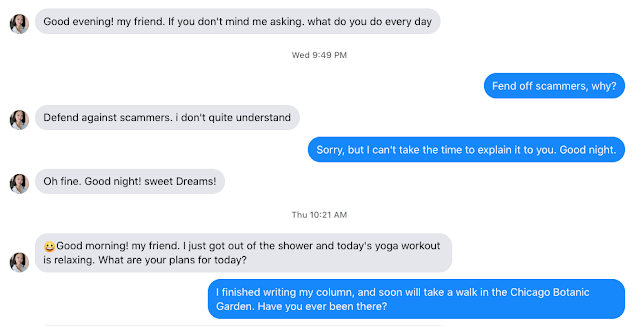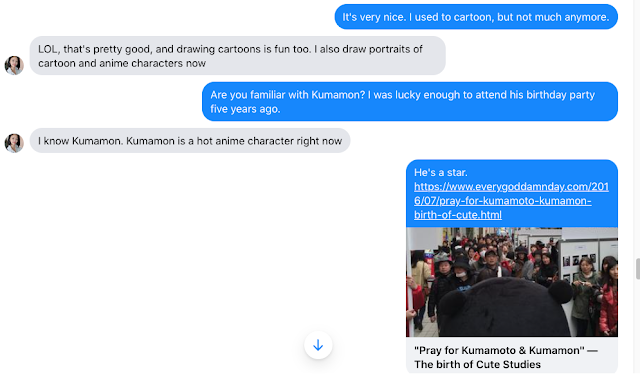It's tomato season. As readers well know, every year I plant a tomato garden and ... well, just look at these beauties, above, on display in a bowl in my kitchen.
Am I proud? Why, sure! I'm so proud that ...
Geez.
How does Trump do it? Lie continually, I mean. I can't even lie about tomatoes.
Okay. To be honest, which I seem doomed to being, not so proud. Not proud at all. Because I didn't grow them. My sister-in-law did.
Okay. To be honest, which I seem doomed to being, not so proud. Not proud at all. Because I didn't grow them. My sister-in-law did.
There, I said it. Are you happy?
The tomatoes were a bolt from the blue. My brother and I were having a belated birthday lunch — 10 weeks late, in fact. We're both busy guys.
I arrived at the restaurant — Blufish on Willow Road, excellent sushi, great prices, first-rate service, and a lux room like some trendy Manhattan eatery — and he was already sitting there.
"I brought you a present," he said, pointing to a shopping bag on the floor. I seized the handles. Heavy. Lifting it to the table with both hands, wondering, What could this be? I look inside. Tomatoes. A lot of tomatoes. Big, beefy, red. Perfectly ripe.
I felt a surge of complicated emotion that, in a movie, would involve flashing to the stunted tomato plants in my garden, and their pathetic output — mostly green, a few quivering on turning red — with this bounty. Game, set, match for my brother. Or, rather, his wife, since she had grown them.
"What's Japanese for 'tomato shame'?" I asked. My sister-in-law is from Osaka.
"Tomato no haji," he said.
I am shamed, tomato-wise. Plunged into tomato shame hell. It wasn't always like this. I remember those years, of carrying bags of tomatoes to the neighbors. Share the bounty. My bounty, the bounty of tomatoes grown by me.
The tomatoes were a bolt from the blue. My brother and I were having a belated birthday lunch — 10 weeks late, in fact. We're both busy guys.
I arrived at the restaurant — Blufish on Willow Road, excellent sushi, great prices, first-rate service, and a lux room like some trendy Manhattan eatery — and he was already sitting there.
"I brought you a present," he said, pointing to a shopping bag on the floor. I seized the handles. Heavy. Lifting it to the table with both hands, wondering, What could this be? I look inside. Tomatoes. A lot of tomatoes. Big, beefy, red. Perfectly ripe.
I felt a surge of complicated emotion that, in a movie, would involve flashing to the stunted tomato plants in my garden, and their pathetic output — mostly green, a few quivering on turning red — with this bounty. Game, set, match for my brother. Or, rather, his wife, since she had grown them.
"What's Japanese for 'tomato shame'?" I asked. My sister-in-law is from Osaka.
"Tomato no haji," he said.
 |
| My tomatoes are just sad. |
But in recent years, not so much. Okay, not at all. I have an idea what's been stunting them — my apple tree, planted unwisely next to the garden 20 years ago, must hog enough sun. Switching out the soil for fresh compost hasn't done the trick.
Don't get me wrong. I'm not completely lame in the garden. The cucumbers have been fabulous this year. Massive. Each one bigger than the next, monsters the size of my forearm. As soon as we polish off one there's another on deck. Which is good because, as you know, a cucumber goes bad in about three days, so it's great to have a steady, fresh, free supply.
Being a word guy, I distracted myself by focusing on the Japanese word for tomato — tomato — which seemed odd, since the fruit came to that country in the Edo period — the 1600s — by Portuguese traders. At first they were considered merely decorative; it took several hundred years for people there to start eating them.
Don't get me wrong. I'm not completely lame in the garden. The cucumbers have been fabulous this year. Massive. Each one bigger than the next, monsters the size of my forearm. As soon as we polish off one there's another on deck. Which is good because, as you know, a cucumber goes bad in about three days, so it's great to have a steady, fresh, free supply.
 |
| One of the first paintings of tomatoes in Japan, by Kanō Tan’yū (1602-1674) |
Europeans, too, were slow to eat tomatoes, which remember are part of the nightshade family, along with deadly nightshade and belladonna. (The leaves and roots of tomato plants are indeed poisonous).
The Oxford English dictionary offers some interesting historical takes: Grimstone's 1604 D'Acosta's History of the Indies, mentions "...Tomates, which is a great sappy and savourie graine." Then there is an evocative 1753 citation from Chambers Cyclopedia Supplement, "Tomato, the Portuguese name for the fruit of the lycopersicon, or love-apple; a fruit eaten either stewed or raw by the Spaniards and Italians and by the Jew families in England."
The "love apple" term was due to its supposed aphrodisiac properties Noah Webster mentions it in his 1828 dictionary, though Samuel Johnson omits any hint of tomatoes in his 1755 dictionary, despite the word being in use. My Wentworth & Flexner Dictionary of American Slang cites the "a very attractive girl or young woman" meaning back to 1951, and R.S. Prather's Bodies in Bedlam: "The idea that such a luscious tomato might be mixed up in a murder went square against the grain."
Circling back to Japan, which originally called tomatoes togaki, which means, "Chinese persimmons;" they made up for lost time becoming fans of both tomatoes and ketchup, which they call tomato kechappu. Southwestern Japan is Japan's tomato growing center — I've been there, to Kumamoto, for its regional mascot's birthday party, and remember that tomatoes are mentioned in Kumamon's calisthenics song. Japan also holds the Guinness world record for largest tomato plant.
 |
| "Karaage-kun Tomato BBQ Sauce Flavor" is a mixture of BBQ sauce and ketchup. |
So how did Japanese tomatoes end up with tagged to an English loan word name? The short answer is: they didn't. Both Japan and the United States borrowed the word from the same original source. Tomatoes are thought to have originated in South America, probably Ecuador or Peru, then found their way to the future Mexico, where the Aztecs named them tomatl. English has a number of foodstuffs that echo Nahuatl, the Aztec language: avocado (ahuakatl); chocolate (xocolatl); and chili (cilli).
It's sorta cool to think that the ingredients you're assembling for dinner were called for, using basically the same name, by someone hungry after a long afternoon watching ritual victims having their hearts torn out atop a pyramid to the greater glory of Quetzalcoatl 500 years ago.
It's sorta cool to think that the ingredients you're assembling for dinner were called for, using basically the same name, by someone hungry after a long afternoon watching ritual victims having their hearts torn out atop a pyramid to the greater glory of Quetzalcoatl 500 years ago.
I've been eating my bounty at almost every meal. On fresh bread, with goat cheese and butter. In peaches and tomato salad. Or cucumber and tomato salad. Or just sliced, eaten with a knife and fork and a spritz of fig vinegar. I've even experienced the joy of sharing. A neighbor stopped to chat, with his beautiful Doberman. We talked politics for a long time, then I had an epiphany.
"Say," I said. "Would you like some tomatoes?" He nodded happily yes, he would. I ran in the house and selected four big beauties.





















































